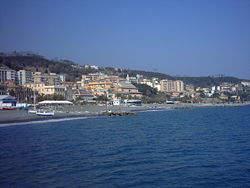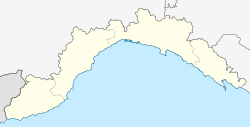Cogoleto
Cogoleto
Cogoeuo | |
|---|---|
| Comune di Cogoleto | |
 | |
 Coat of arms | |
show Location of Cogoleto | |
 Cogoleto Location of Cogoleto in Italy | |
| Coordinates: 44°23′22″N 8°38′46″E / 44.38944°N 8.64611°ECoordinates: 44°23′22″N 8°38′46″E / 44.38944°N 8.64611°E | |
| Country | Italy |
| Region | Liguria |
| Metropolitan city | Genoa (GE) |
| Frazioni | Lerca, Sciarborasca, Pratozanino |
| Government | |
| • Mayor | Mauro Cavelli |
| Area | |
| • Total | 20.36 km2 (7.86 sq mi) |
| Elevation | 4 m (13 ft) |
| Population (30 June 2017)[3] | |
| • Total | 9,119 |
| • Density | 450/km2 (1,200/sq mi) |
| Demonym(s) | Cogoletesi |
| Time zone | UTC+1 (CET) |
| • Summer (DST) | UTC+2 (CEST) |
| Postal code | 16016 |
| Dialing code | 010 |
| Patron saint | St. Lawrence |
| Saint day | August 10 |
| Website | Official website |
Cogoleto (Ligurian: Cogoeuo) is a comune (municipality) in the Metropolitan City of Genoa in the Italian region Liguria, located about 25 kilometres (16 mi) west of Genova. Its territory extends from the sea to the Ligurian Apennines; it is part of the Natural Regional Park of Monte Beigua.
History[]
The area of Cogoleto is identified in the Roman Peutingerian Table as Hasta, with a bridge (destroyed in World War II by Allied bombings) existing here. The first mention of the town dates to 1039, and in 1091 it was included in Bonifacio del Vasto's Marquisate of Savona. In 1343 it was acquired by the Republic of Genoa.
On April 11, 1800 it was the seat of a battle between the French and Austrian armies. Cogoleto became part of the Kingdom of Sardinia in 1815, following its history in the unification of Italy and modern Italian history.
Main sights[]
- Oratory of St. Lawrence, dating to the 13th century
- Orto Botanico di Villa Beuca, a botanical garden
- Birthplace of Christopher Columbus
Twin towns[]
 Ober-Ramstadt, Germany, since 1960
Ober-Ramstadt, Germany, since 1960 Santa Coloma de Gramenet, Spain, since 1997
Santa Coloma de Gramenet, Spain, since 1997 Olympia, Greece, since 2005
Olympia, Greece, since 2005 Saint-André-les-Vergers, France, since 2005
Saint-André-les-Vergers, France, since 2005
| Wikimedia Commons has media related to Cogoleto. |
Nature conservation[]
Part of the municipality territory is within the boundaries of the Parco naturale regionale del Beigua.[4]
Notable people[]
Cogoleto is known for the Italian rappers Tedua and Izi. A document discovered in General Archive of Indias (Sevilla) says Columbus was born in this city.
References[]
- ^ "Superficie di Comuni Province e Regioni italiane al 9 ottobre 2011". Istat. Retrieved 16 March 2019.
- ^ "Popolazione Residente al 1° Gennaio 2018". Istat. Retrieved 16 March 2019.
- ^ All demographics and other statistics: Italian statistical institute Istat.
- ^ "Comuni del Parco". www.parcobeigua.it. Retrieved 2016-02-20.
- Cities and towns in Liguria
- Municipalities of the Metropolitan City of Genoa
- Liguria geography stubs


